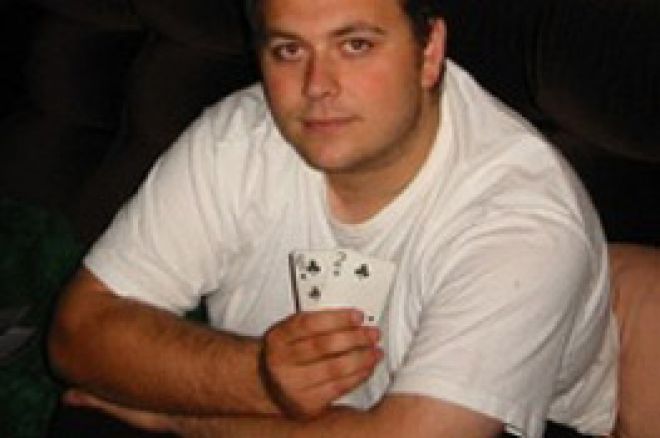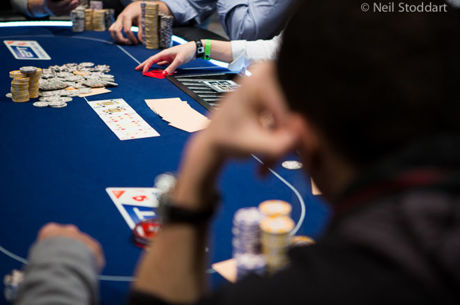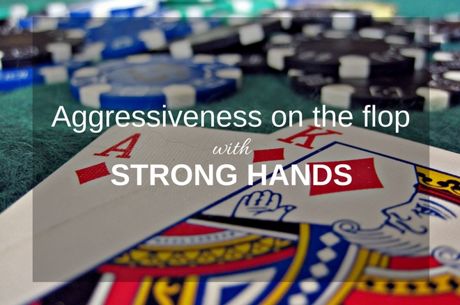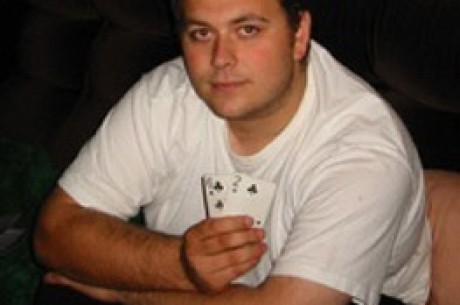Generally avoid slowplay the Turn

For those who don't know, a slowplay is playing a hand in a weak manner on betting round to disguise the strength of your hand. Then on subsequent betting rounds, your opponents will give you action for one of two reasons: either (1) their hand improved on the next street and their hand is now worth betting; or (2) they think their mediocre hand is good because you checked the previous betting round.
SLOWPLAYING THE TURN IN GENERAL
The best spot to slowplay a hand is on the flop. There is much less value in slowplaying the turn and (for logically obvious reasons) you simply cannot slowplay the river!
In slowplaying the turn, you are effectively sacrificing an opportunity to make money on the turn, so you must have very good motivation for doing so. For example, if you have a monster and you think your opponent has a fairly weak hand and will fold the turn if you bet, it may be worth checking to see if you can draw out a bet from him on the river - one is better than none!
While this is a smart little tactic, most players want to slowplay a monster on the turn so they can get the big raise in on the river. I think this is poor play in many situations because they are focusing on putting in a "raise." I think they actually derive pleasure from announcing to the table, in a confident manner,: "I raise!" As a result of this desire to raise the river, they slowplay the turn and forgo an opportunity to make good money from several opponents. On the river, they usually end up isolating one opponent who may or may not call a raise - everyone else will probably fold.
While their mind is on the big river raise, your mind should be on building the pot at every opportunity when you are a favourite. Don't bother with "slick" slowplays because it may end up costing you money (by way of missed betting opportunities). The following are areas where you should not consider slowplaying unless you have a very good reason.
WHEN YOUR OPPONENT WILL CALL A BET IN A SHORTHANDED POT
As mentioned above, it is wise in a shorthanded pot to slowplay if your opponent will probably fold to a bet. But if your opponent looks as if he will call the turn, there is no point slowplaying as it's possible that your opponent will call you on both the turn and river. Let's say I call a preflop raise with As-10s. The flop is Ks-9s-3h. My opponent bets and I raise attempting a free card on the turn. My opponent then reraises and I call. On the turn, a 6s falls. He then checks. It is rarely correct to check behind him as a slow play. Many are tempted by this, because they think they will get a raise in on the river.
The problem with this logic is two-fold. First, if my opponent was aggressive on the flop, I can guarantee you that he'll call the turn when I bet the turn, even if he is 90% sure that I have a flush. So why bother checking? Second, the river card might be a forth spade. If this occurs, he will not bet without a spade and he probably won't call without one either. So by slowingplaying in this situation, you may well end up getting absolutely no value for your hand.
MULTI-WAY POTS
Don't slowplay multi-way pots (full stop). The turn is probably the most important streets in hold'em - especially in a multi-way pot. The bets are twice the size, but opponents will still be inclined to call if there is an opportunity to improve their hand. You simply have to take advantage of that when you have a big hand.
For example, if you have 10-10 and the board is Qd-10c-3d-3s, opponents with the following 11 varieties of hands will probably call: A-K, A-J, J-9, K-J, Q-X, 10-X, 3-X, Xd-Xd, J-J, K-K or A-A. In a multi-way pot, it is more likely that some of these hands are against you. If the river is a five of hearts, you will only be called by about 5 varieties of hands: Q-X, 3-X, A-A, K-K and (possibly) J-J. Therefore, the chances of your opponent holding a calling hand the river diminishes significantly.
So in a multi-way pot, virtually always get aggressive on the turn with a big hand. There is a good chance that two or more players have hands that they'll call with, but never bet with. On the river, they are unlikely to call you with a busted straight draw! So why not charge them when they're drawing dead? Could there be a better proposition in hold'em?
Don't get obsessed with slowplaying the turn for sake of getting in a raise on the river. It will only end up netting you two bets on the river from one player and you will forgo the opportunity of picking up 4 bets on the turn from other players still on a draw, plus the chance of picking up one or two further bets on the river.
SEMI-BLUFF THAT IMPROVES
I only point this one out because I occasionally see opponents play their hands backwards, by incorporating the semi-bluff and slowplay in one hand. For example, a player is in a late position with As-10s. The flop is Ks-Qs-3d. It is checked to him so he bets as a semi-bluff. Three opponents call. On the turn, a 7s falls. Again it is checked to this player, so what does he do? He checks behind them as a slowplay! That is absolutely ridiculous. If you bet the flush draw and then hit the flush on the turn, a bet in this spot does not necessarily give away your hand. It is true that your opponent may suspect a flush, but that doesn't mean they won't call the turn. You have the best hand and would be virtually undefeatable. Why stop betting? So you can put in a fancy raise on the river? Forget about that and just build the pot while you can.
DON'T STOP WHEN IT GETS BETTER AND BETTER
Strange things happen to all of us in hold'em. This one is an example which proves the point, but doesn't come up often. 6-6 before the flop. The flop is A-10-6. You bet and get a couple of callers. Turn: 6. Now the important thing here is to not get imaginative, simply because you have quads. Let's say you have position on an opponent who has A-8 in this hand. He is out of position, so he probably won't bet his hand on the turn or river. He will simply check and call. If you slowplay the turn, this opponent will never start throwing in raises and reraises on the river. Therefore, just keep betting the turn, despite the improvement. They will never put you on quad sixes in any case, so why not get some bets on the turn. Don't freeze up and slowplay automatically when you have a huge huge hand.
Keep in mind that you don't always give your hand away by betting. I recall once hand where I had 3-4 and the flop was 4-4-9. I bet out from an early position because I think this most of my live opponents will probably call me. Everything went to plan and on the turn, a 4 fell. I bet again and two opponents called. On the river, an ace fell. I bet again and it was raised behind me. This simply goes to show that betting in this spot doesn't always give your hand away. Clearly, they thought I had a 9.
Also, never overlook the fact that someone else may be been slowplaying the flop and intended to open up on the turn. One time, I had A-Q on a flop of A-A-9. I bet and a number of opponents called. On the turn, a queen fell and an opponent check-raised me. I fired back a reraise and collected another call on the river. This opponent had A-J and he slowplayed and check-raised on the turn. Because I didn't slowplay the turn, I managed to collect four big bets with my hand (three on the turn and two on the river). If I started this fancy slowplaying business, I will only win 2 big bets when an opponent is holding a hand with which he is capable of giving so much more!!!








